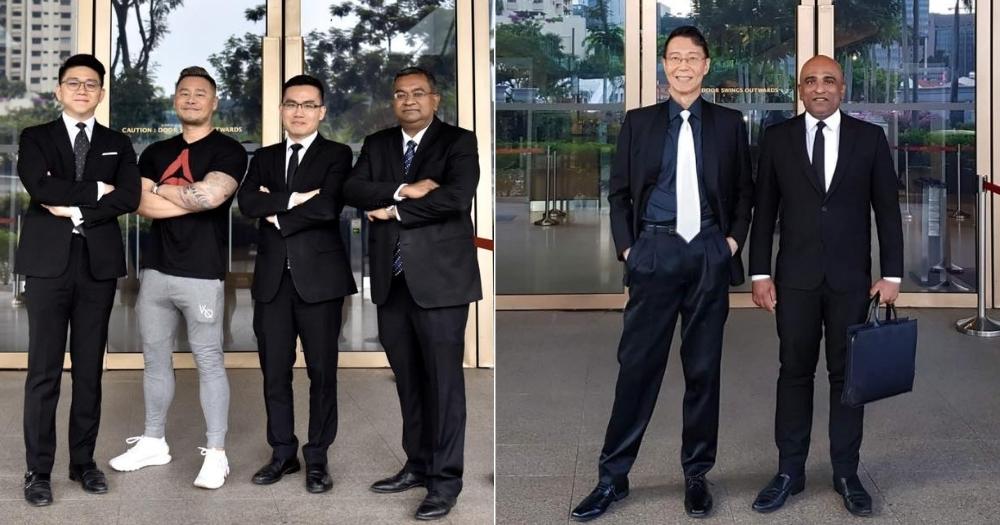Follow us on Telegram for the latest updates: https://t.me/mothershipsg
The Court of Appeal in Singapore on Feb. 28 has upheld a lower court's decision and dismissed the three challenges to Section 377A of the Penal Code, CNA reported.
Court of Appeal dismissed appeals
The three challenges were mounted by Johnson Ong Ming, Roy Tan Seng Kee, and Bryan Choong Chee Hoong in the High Court in November 2019.
After the High Court judge See Kee Oon dismissed the three men's challenges on Mar. 30, 2020, they appealed against this decision with the Court of Appeal, the highest judicial court in Singapore.
Ong was represented by lawyers from Eugene Thuraisingam LLP, Tan was represented by lawyer M Ravi, and Choong by a team led by Senior Counsel Harpreet Singh Nehal, according to CNA.152-page written judgement
Through Chief Justice Sundaresh Menon, who delivered the 152-page written judgement on behalf of a five-judge panel, the Court of Appeal said the appeals are "not about whether Section 377A should be retained or repealed", as this was "a matter beyond our remit".
Quoting Prime Minister Lee Hsien Loong, who said homosexual individuals are "part of our society" and "our kith and kin", Chief Justice claimed that the appeals are also not "about the moral worth of homosexual individuals".
Nor were the appeals "about the fundamental nature of sexual orientation (whether immutable or not)", said Chief Justice, who added that this was an "extra-legal question well beyond the purview of the courts".
Political reality surrounding 377A
Chief Justice listed the three main points from a summary of the "political reality" surrounding Section 377A, CNA reported.
Firstly, Chief Justice maintained that while Section 377A was retained, it is not proactively enforced.
"The government's evident unwillingness to repeal Section 377A signals its assessment that society has yet to adequately integrate the opposing views of mainstream conservatives and the homosexual community, as well as its awareness that our multi-racial, multi-lingual and multi-religious community remains vulnerable along such fault lines. The government was especially cognisant that forcing the issue would polarise those who are 'presently willing to live and let live'."
Next, the retention of Section 377A in 2007 "was directed at addressing a deeply divisive socio-political issue in a pragmatic way".
The decision, Chief Justice said, "was a legislative one that was informed not by the purpose behind the enactment of the provision some seven decades earlier, but by the government's objective of striking an optimal compromise between competing interests in our society and accommodating differing perspectives on homosexuality".
Lastly, a "political compromise" on Section 377A was reached in 2007 for the purpose of striking "a careful balance between the opposing interests of various groups".
"The retention of Section 377A served to accommodate the views of the more conservative segments of society, while the caveat that Section 377A would not be proactively enforced served to accommodate the interests of homosexual individuals and to allow them to live their lives in as full a space as is presently possible."
Other points in Court of Appeal's judgement
In listing the other points in the Court of Appeal's judgements, Chief Justice said the right to express one's sexual identity, even in private, is not an expressed constitutional right.
He added that Section 377A is not an "absurd" law.
This, he said, was evident from parliamentary debates, which have shown that "many reasonable people do in fact see Section 377A as being morally justified".
Chief Justice said: "Numerous parliamentarians spoke up in favour of retaining Section 377A, often on the ground of safeguarding societal morality and with the recognition that a sizable segment of our society regards homosexual behaviour as unacceptable."
Finally, the Court of Appeal agreed with See that Section 377A does not violate Article 9(1) of the Constitution of Singapore, which states that no person shall be deprived of his life or personal liberty save in accordance with the law.
Background
The trio's decision to challenge against 377A came after former Chief Justice Chan Sek Keong called for a review of Section 377A in a paper, "Equal Justice under the Constitution and Section 377A of the Penal Code".
In his paper, which was published online by the Singapore Academy of Law Journal on Oct. 14, 2019, Chan said the law was outdated as it was passed to clamp down on the widespread male prostitution in 1938.
Two former attorneys-general had also made public comments on the law.
Choong's lawyers echoed Chan's point of how Section 377A was originally intended to curb "rampant" male prostitution during the colonial era, and claimed that Section 377A does not criminalise penetrative sex.
This was based on new historical material recently declassified that showed that the introduction of Section 377A in 1938.
They further argued that Section 377A was inconsistent with Article 12 and 14 of Singapore's constitution, which guarantees equality before the law and the equal protection of the law, and guarantees the freedom of expression respectively.
The other arguments put forth by the other two men were:
- Ong's team argued that Section 377A criminalises gay men for what is essentially their identity, because homosexuality is not a choice; it results from biological causes. As such, Ong's legal counsel claimed that Section 377A violates Article 9 and 12 of Singapore's Constitution.
- Tan's lawyer claimed that having this law on the books is "absurd", because while the government has said that it will not proactively enforce Section 377A, the police is still legally obligated to investigate when it is invoked.
State Counsels representing the Attorney-General's Chambers had previously argued that Section 377A is constitutional and should be decided by the legislature or Parliament instead of the judiciary.
Read more
Follow and listen to our podcast here
Top image from Ready4Repeal/Facebook
If you like what you read, follow us on Facebook, Instagram, Twitter and Telegram to get the latest updates.
